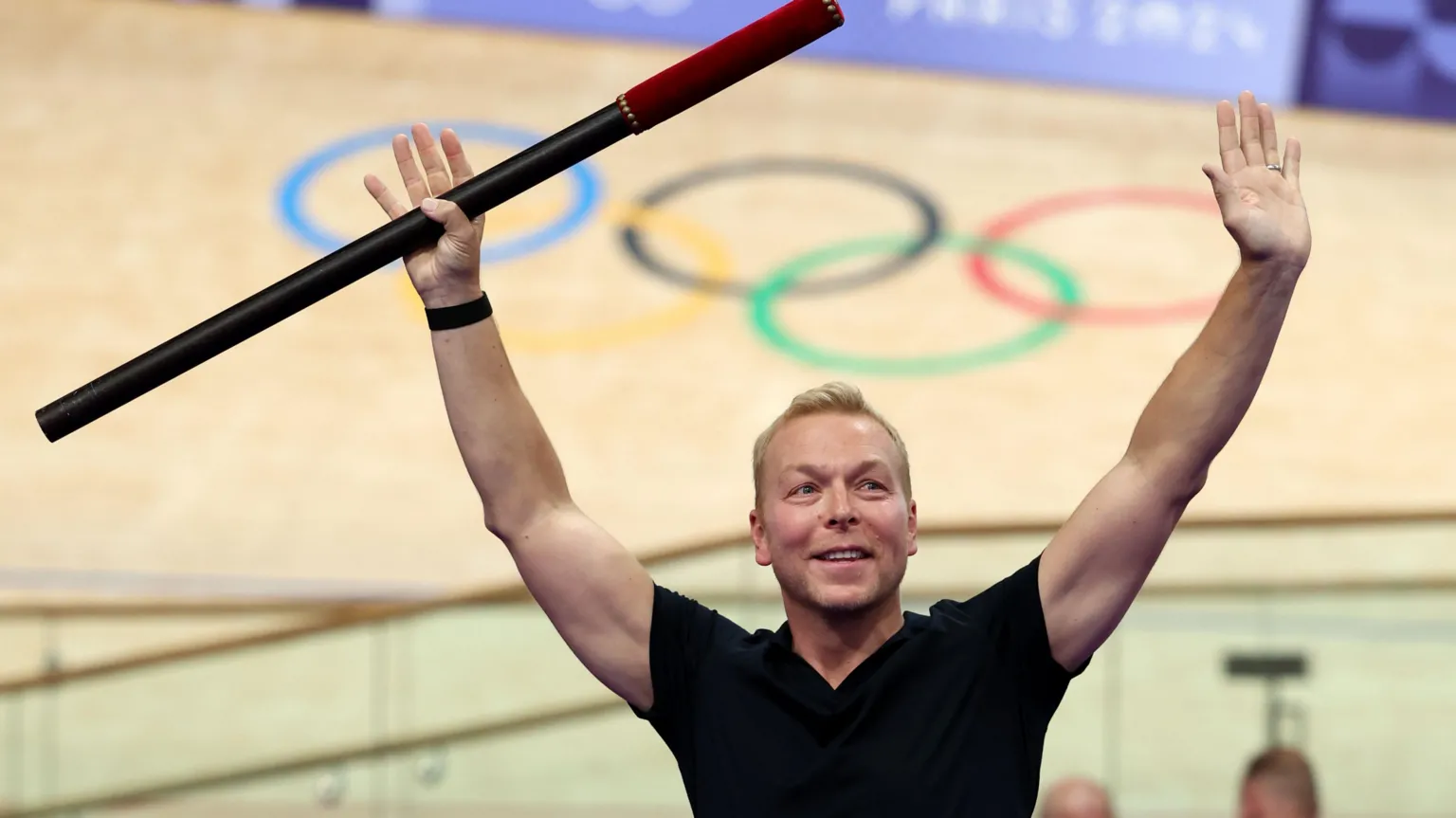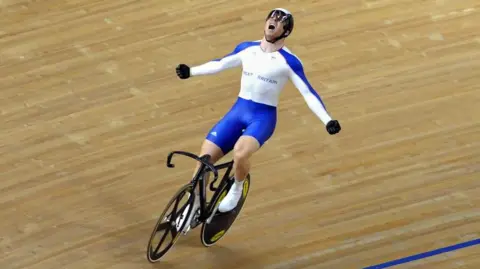Cyclist Chris Hoy announces that his cancer is terminal

Six-time Olympic Champion Sir Chris Hoy Reveals Terminal Cancer Diagnosis
In an interview with the Sunday Times, he says doctors have told him he has between two and four years to live.
He told the Sunday Times that he had been diagnosed with primary cancer in his prostate, which had spread to his bones – meaning it was stage four.
Later on Sunday, the legendary athlete said on Instagram that he was “feeling fit, strong and positive”.
Health Secretary Wes Streeting told the BBC’s Laura Kuenssberg he was “in awe” of Sir Chris’s courage, positivity and “wonderful message of hope”, adding that the “whole nation will be cheering him on now” and sending love.
Sir Chris Hoy’s Illness and Response
The 48-year-old Scot revealed earlier this year that he had been diagnosed with cancer. He had not previously disclosed the type of cancer.
Sir Chris won six Olympic golds between 2004 and 2012 – the second highest total by any British Olympian behind Sir Jason Kenny’s tally of seven.
He retired from cycling in 2013 and in recent years has been a regular pundit and commentator as part of BBC Sport’s cycling coverage.
Sir Chris told the newspaper he has known for a year that his cancer is terminal.
Tumours were discovered in his shoulder, pelvis, hip, spine, and rib.
Sir Chris said, “As unnatural as it feels, this is nature. You know, we were all born and we all die, and this is just part of the process. You remind yourself, aren’t I lucky that there is medicine I can take that will fend this off for as long as possible.”
Sir Chris added, “Hand on heart, I’m pretty positive most of the time and I have genuine happiness. This is bigger than the Olympics. It’s bigger than anything. This is about appreciating life and finding joy.”
Outpouring of Support and Well Wishes
After the Sunday Times article was published, he posted a message on Instagram saying: “You may see in the news this weekend some articles about my health, so I just wanted to reassure you all that I’m feeling fit, strong and positive, and overwhelmed by all the love and support shown to my family and me. Onwards!”
There were many supportive comments and good wishes underneath the post, including from fellow former Olympic cyclist Mark Cavendish who called Sir Chris a “hero of a human being”.
Olympic athlete Dame Kelly Holmes also commented “sending love to you Chris” and the British Cycling account left an emoji showing two hands making a heart symbol.
Prime Minister Sir Keir Starmer on X hailed Sir Chris as “a British sporting legend” and said “the whole country is behind him and his family”.
Scores of other sporting names have sent well wishes too, including four-time Olympic gold medal rower Matthew Pinsent and two-time gold medal swimmer Rebecca Adlington, who told Sir Chris “you continue to be my only role model”.
Speaking on the Sunday with Laura Kuenssberg programme, Streeting added that Sir Chris was “not the only person” dealing with a terminal cancer diagnosis, so had “done the country such an enormous service” by being open and positive.
“That’s worth even more than the stack of Olympic gold that he’s built up over his career,” he continued.
Streeting was diagnosed with cancer in 2021, aged 38, and had an operation to remove a kidney as part of his treatment. He announced he was cancer-free later that year.

PA
The Olympian’s cancer was discovered last year after a routine scan for shoulder pain – he thought he had injured himself while lifting weights at the gym – revealed a tumor.
The athlete was with his wife Sarra when he was given his terminal diagnosis. The couple has two children, Callum and Chloe, who were aged nine and six at the time.
Just before Sir Chris’s tumor was discovered, Sarra had undergone scans that would later show she had multiple sclerosis, a degenerative disease.
Former prime minister Gordon Brown said that courage had “defined” Sir Chris’s career and “now characterizes how Chris and Sarra both face their health diagnoses and embrace life”.
Scotland’s first minister John Swinney called Sir Chris “a person of incredible courage”, sending him good wishes in an X post.
Edinburgh-born Sir Chris, who was first inspired to take up cycling by the famous BMX scenes in the film E.T., had won six Olympic, 11 world, and 43 World Cup titles by the time he retired.
The cyclist first won gold at the Athens Olympics in 2004 and went on to secure three more gold medals four years later in 2008 Beijing. He won two further golds in London 2012.
Such was his prestige that he was chosen to be the flag bearer for Team GB at the closing ceremony of the 2008 Olympics and then again at the opening ceremony for the London Olympics four years later.
A stadium built in Glasgow for the 2014 Commonwealth Games was named in his honor.
Talking to Stephen Nolan on BBC Radio 5 Live, Simon Richardson, editor of Cycling Weekly magazine, called Sir Chris “the epitome of the Olympic champion”.
Michael Hutchinson, a journalist and former professional cyclist, echoed that, calling the Olympic champion a “talisman” in an interview on 5 Live Breakfast.
He added it was “inspiring” that Sir Chris had not shown “an ounce of self-pity” in announcing his diagnosis.
Since retiring, Sir Chris has written several books for children alongside his contribution to BBC cycling coverage.
He has also been writing a memoir for the last year, which is due to be published next month.
This week he has been appearing on BBC Two, co-presenting the coverage of the World Track Championships with Jill Douglas in Denmark.
SDGs, Targets, and Indicators Analysis
1. Which SDGs are addressed or connected to the issues highlighted in the article?
- SDG 3: Good Health and Well-being
The article discusses Sir Chris Hoy’s terminal cancer diagnosis and his health condition. This directly relates to SDG 3, which aims to ensure healthy lives and promote well-being for all at all ages.
2. What specific targets under those SDGs can be identified based on the article’s content?
- Target 3.4: By 2030, reduce by one-third premature mortality from non-communicable diseases through prevention and treatment and promote mental health and well-being.
The article mentions that Sir Chris Hoy has been diagnosed with stage four cancer, which is a non-communicable disease. Target 3.4 specifically addresses reducing premature mortality from non-communicable diseases, which includes cancer.
3. Are there any indicators mentioned or implied in the article that can be used to measure progress towards the identified targets?
- Indicator 3.4.1: Mortality rate attributed to cardiovascular disease, cancer, diabetes, or chronic respiratory disease.
The article mentions that Sir Chris Hoy’s cancer is terminal, indicating a high mortality rate attributed to cancer. Indicator 3.4.1 measures the mortality rate attributed to non-communicable diseases, including cancer.
4. Table: SDGs, Targets, and Indicators
| SDGs | Targets | Indicators |
|---|---|---|
| SDG 3: Good Health and Well-being | Target 3.4: By 2030, reduce by one-third premature mortality from non-communicable diseases through prevention and treatment and promote mental health and well-being. | Indicator 3.4.1: Mortality rate attributed to cardiovascular disease, cancer, diabetes, or chronic respiratory disease. |
Source: bbc.com









